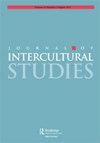重新定义难民抵抗和脆弱性:澳大利亚重新安置背景下的哈扎拉社区出版
IF 1
Q3 SOCIOLOGY
引用次数: 0
摘要
本研究的重点是通过与哈扎拉人(一个受迫害的文化和语言群体)合作的社区出版,在一个西方移民国家进行跨文化谈判和当代民族和文化认同的建构。作为一个研究团队,我们主要采用访谈的方式,研究了多元文化儿童图书制作项目和2018年至2022年间进行的跨文化谈判,这导致了三种语言(英语、哈扎拉吉语和达里语)的阿富汗儿童故事的出版,其中包括儿童创作的艺术品。精心制作的研究叙述是用来呈现参与者的声音真诚和尊重,因为他们慷慨地参与我们的研究过程。我们将朱迪思·巴特勒的语言脆弱性分析框架作为抵抗的生成基础,来研究在澳大利亚定居的哈扎拉吉人是如何经历语言不稳定性的。我们发现,社区博彩和出版涉及复杂的翻译和音译过程,其中面临着有关文化和语言权威的实际和政治问题。参与这一跨文化谈判的过程为重新定义可识别和可理解的哈扎拉身份提供了新的可能性。我们认为,在语言不稳定的重新安置背景下,可以通过尊重其意义创造资源的文化和语言响应基础设施来支持难民更宜居的生活。本文章由计算机程序翻译,如有差异,请以英文原文为准。
Refiguring Refugee Resistance and Vulnerabilities: Hazara Community Publishing in the Australian Resettlement Context
This research focuses on intercultural negotiations and constructions of contemporary ethnic and cultural identity in a Western country of resettlement, through collaborative community publishing with Hazara people, a persecuted cultural and linguistic group. As a research team, primarily using interviews, we examined the multicultural children’s bookmaking project and the intercultural negotiations undertaken between 2018 and 2022 which led to the publication of an Afghanistani children’s story in three languages (English, Hazaragi and Dari) with artwork created by children. A crafted research narrative is used to present participants’ voices genuinely and respectfully as they generously engaged with our research process. We build upon Judith Butler’s analytical framework of linguistic vulnerability as the generative foundation of resistance to examine how linguistic precarity for Hazaragi speakers resettling in Australia is experienced. We found that community bookmaking and publishing involved complex processes of translation and transliteration where practical and political problems about cultural and linguistic authority were confronted. Engaging in this process of intercultural negotiation affords new possibilities for the resignification of recognisable and intelligible Hazara identities. We argue that a more liveable life for refugees in linguistically precarious resettlement contexts can be supported through culturally and linguistically responsive infrastructure that is respectful of their meaning making resources.
求助全文
通过发布文献求助,成功后即可免费获取论文全文。
去求助
来源期刊

Journal of Intercultural Studies
SOCIOLOGY-
CiteScore
1.80
自引率
10.00%
发文量
67
期刊介绍:
Journal of Intercultural Studies showcases innovative scholarship about emerging cultural formations, intercultural negotiations and contemporary challenges to cultures and identities. It welcomes theoretically informed articles from diverse disciplines that contribute to the following discussions: -Reconceptualising notions of nationhood, citizenship and belonging; -Questioning theories of diaspora, transnationalism, hybridity and ‘border crossing’, and their contextualised applications; -Exploring the contemporary sociocultural formations of whiteness, ethnicity, racialization, postcolonialism and indigeneity -Examining how past and contemporary key scholars can inform current thinking on intercultural knowledge, multiculturalism, race and cultural identity. Journal of Intercultural Studies is an international, interdisciplinary journal that particularly encourages contributions from scholars in cultural studies, sociology, migration studies, literary studies, gender studies, anthropology, cultural geography, urban studies, race and ethnic studies.
 求助内容:
求助内容: 应助结果提醒方式:
应助结果提醒方式:


